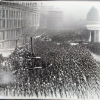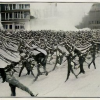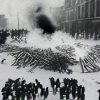What if at the time when the noninterventionist United States was on a verge of entering WWI against Germany in early 1917 after the Zimmerman Telegraph incident, the public reaction despite the newspaper and American propaganda attempting to rally up support somehow in this alternate scenario for sakes ends up failing horribly at convincing and instead we see massive anti-war demonstrations and strikes by men and woman alike taking place across the streets in the US. Now in this alternate timeline, majority of American people at that time just simply have a different mindset about the military conflict with more people generally being simply pro-German and have anti-British sentiment or simply want a different response to the Zimmerman Telegraph crisis rather than an international military escalation and are strictly against in conscription or even having someone loved ones being sent to the fronts across the sea and the public is averagely more aggressive and confrontable to do anything change the foreign policy, even if it would lead to violence or chaos...
So, from that moment, President Wilson along with the government officials and congressional lawmakers would face a really hard decision by the constituents in whether to succumb to the growing public demand and pursue non-military escalating policy or weigh in and join the war hence risking potential unrest and chaos. If these were the cases as I mentioned, what would realistically the US government had done in these two following scenarios: 1.) The US decides to go on a continued noninterventionist path and somehow deal with the Zimmerman Telegraph crisis peacefully how would that play out. 2.) The US "adds fuel to the fire" and declares war via Congress despite obvious strong and threatening force of public opposition, then how would this violent massive uprising look and how would state and federal government respond to this and what long-lasting impact would it have played subsequently?
So, from that moment, President Wilson along with the government officials and congressional lawmakers would face a really hard decision by the constituents in whether to succumb to the growing public demand and pursue non-military escalating policy or weigh in and join the war hence risking potential unrest and chaos. If these were the cases as I mentioned, what would realistically the US government had done in these two following scenarios: 1.) The US decides to go on a continued noninterventionist path and somehow deal with the Zimmerman Telegraph crisis peacefully how would that play out. 2.) The US "adds fuel to the fire" and declares war via Congress despite obvious strong and threatening force of public opposition, then how would this violent massive uprising look and how would state and federal government respond to this and what long-lasting impact would it have played subsequently?


